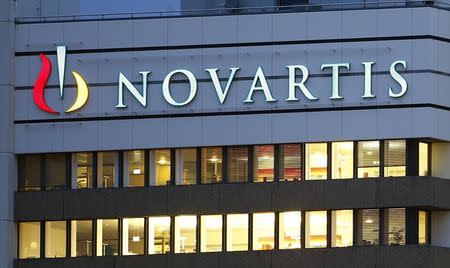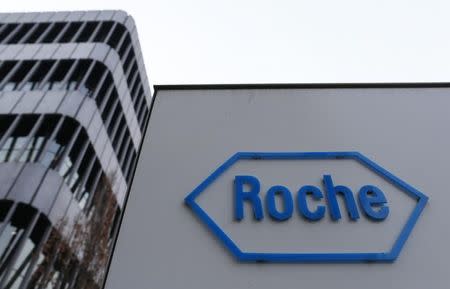Switzerland takes on its top drugmakers in price row
By Caroline Copley ZURICH (Reuters) - Switzerland, home to the world's two biggest drugmakers, might be expected to give them an easy ride. But Roche and Novartis are finding no immunity in their home market from a European-wide price squeeze. Governments and healthcare authorities around the world are questioning whether they are getting the best value for money as they struggle to find space in their budgets to care for an ever older and sicker population. Their demands that medicine prices be cut is a growing challenge for drugmakers. But Switzerland's spat with its pharmaceuticals firms risks alienating some of its largest exporters and employers. Roche and Novartis are the world's biggest drugmakers by market capitalization and the Swiss pharmaceutical industry makes 6 percent of the country's economic output. It is responsible for 40,000 jobs and had sales abroad worth more than 66 billion Swiss francs ($70.5 billion) in 2013. Drugmakers have long argued they need to charge high prices for successful drugs to recoup development costs, including for those that fail to make it to market. But those paying for the drugs now want more for their money's worth - greater innovation and efficiency - before they foot the bill. Swiss per capita spending on pharmaceuticals is already significantly lower than that in other countries: at $562 it is almost half of the $1,010 spent in the United States and behind other European countries including Belgium, Germany, Ireland, France and Greece, according to data from the Organisation of Economic Cooperation and Development. This reflects, in part, measures by the government to reduce the price of patent-protected medicines in recent years. Switzerland's healthcare system is privatized so consumers must pay for it out of their own pocket and claim insurance, but the government is anxious to stop costs from spiraling. However drugs still cost on average 5 percent more in Switzerland than the comparative benchmark of six other European countries - Denmark, Austria, Germany, the United Kingdom, France and the Netherlands - at the end of 2013, according to Santesuisse, an umbrella organization for Swiss health insurers. So in a bid to further push down prices, the Swiss health ministry recently announced plans to amend the pricing system again from 2015 - proposals that infuriated its drugmakers. "The consequence of this would be a significant weakening of the pharmaceutical companies that are active in Switzerland, which would inevitably have a negative impact on their future contribution to the Swiss economy and employment," industry lobby group Vips warned, adding it was likely that additional jobs would be moved abroad. It said the measures did not take into account Switzerland's high wage and cost structure and risked burdening firms already battling a strong Swiss franc. PRICE PAIN Switzerland's export economy is closely tied to the fortunes of the euro zone, its biggest export market, and sluggish growth there has taken a toll in recent years. The economy stalled in the second quarter, hit by stagnation in its main export market Europe and weaker private consumption growth that had propped up demand. The strong Swiss franc has been a further burden, making goods more expensive abroad. To stave off the risk of recession and deflation, the Swiss National Bank capped the franc at 1.20 to the euro in 2011 but prices growth remains largely absent. The country's machinery and electronics industries have borne the brunt of its strong currency. So far its more robust exporters - drugmakers and watchmakers - have held up better. Switzerland makes up roughly just 1-2 percent of pharmaceutical companies' sales, according to industry group Interpharma. But the companies worry that ceding to demands for lower prices at home would cause a domino affect elsewhere. Roche recently refused to accept a price from the Swiss government for its new breast cancer drug Perjeta that was 20 percent lower than that in other European countries. In response, the ministry took it off a list of medicines reimbursed by basic health insurance. Roche Chairman Christoph Franz stood by his decision in a recent interview. "You have to question whether we should give out our medicines in our home market for a price that is 20-30 percent cheaper than in the neighboring EU," he told the BaslerZeitung. "It's obvious that we can't do this from the signal it would send alone." The Vips lobby group says the squeeze could mean patients may have to wait longer for new medicines and risks creating a two-tier system where patients without supplementary health insurance would be denied access to some drugs. It and other lobby groups rejected the government's latest proposals and hope they will garner support from political parties to water down the measures, which include adding more countries to the state's comparative price references as well as including any known discounts elsewhere. INNOVATION PREMIUM Such demands have pressured the average internal rate of return from pharmaceutical research and development, which fell to around 4.8 percent in 2013 from 7.2 percent in 2012 and 10.5 percent in 2010, says a study by Deloitte and Thomson Reuters. Over the same four-year period, the average forecast peak sales of each new drug dropped by 43 percent to $466 million in 2013, reflecting the impact of austerity measures on health spending, plus a shift to more niche drugs. Still the figures mask a big divide in performance between the leaders and the laggards. Roche, which has launched a slew of pricey new cancer drugs in recent years, had a core operating profit margin of 38.3 percent in 2013 compared to 22.5 percent for Novartis, which is faced competition from cheaper copycat drugs. Both Roche and Novartis remain sanguine that healthcare authorities and insurance companies will still cough up for truly innovative medicines, despite pressure on budgets. "The reason why I'm optimistic is that even after 2008, the financial crisis, and two years later when many countries in southern Europe were having a very hard time, we were able to get reimbursement for (our multiple sclerosis drug) Gilenya, because it had best-in-class efficacy," Novartis Chief Executive Joe Jimenez said at the end of August. However drugmakers still have to navigate creative proposals from European governments to make room for the best medicines by seeking cutbacks elsewhere. In July, French lawmakers amended their social security budget to allow the use of Roche's cancer drug Avastin as a cheaper treatment for age-related vision loss, even though it is not designed for this purpose. And in Italy, the government is seeking 1.2 billion euros ($1.55 billion) in damages from Roche and Novartis for allegedly colluding to try and stop Avastin from being used as a cheaper alternative over their more expensive drug Lucentis. Companies, insurers and healthcare authorities will have to work out together ways to reward innovative medicines without threatening the supply of medicines, said Patrick Flochel, global pharmaceuticals leader at consultancy firm EY in Zurich. "Pharma companies need to come up with suggestions about how to work together with payers and providers, to find ways to make it possible for healthcare systems to be sustainable while patients benefit from innovation." (Additional reporting by Paul Arnold; Editing by Sophie Walker)



